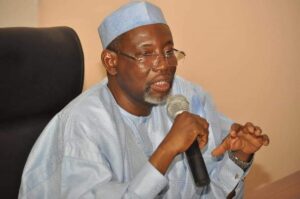Nigeria’s public debt may rise to N80trn or more by end of 2023 — Expert
By Seun Ibiyemi
The Director General, Centre for the Promotion of Private Enterprise (CPPE), Dr. Muda Yusuf, reacting to the increase in Nigeria’s public debt to N49 trillion from N46 trillion said there are tendencies it may rise to N80 trillion or more by end of the year.
He made this disclosure yesterday in a telephone interview with Nigerian NewsDirect Daily newspaper.
Recall that The Debt Management Office (DMO) has said Nigeria’s total foreign debt for March 31, 2023, has risen to N49.85 trillion ($108.30 billion) from N46.25 trillion as of December 21 2022.
According to the statement, the total public debt containing the external and domestic debts of the Federal Government, the 36 states, and the Federal Capital Territory was N49.85 trillion.
The DMO, however, added that the recently securitised Ways and Means loans of N22.719 trillion would be included as Federal Government domestic debt from June 2023.
Dr. Yusuf said the surge in Nigeria’s public debt is just a trend that may even last till the end of the year.
According to him, “this is just a trend, the trend is likely to continue at least for some time at least for the rest of the year. With time, we would begin to see the impact of the first subsidy removal, the changes that will be made.
“Also the impact of the exchange rate unification, we also expect some revenue to come from there and if we are lucky, we have much more impact on oil test, that is the attack or the battle on the crude oil test we would be able to win the battle but win it substantially, that will also help to reduce the debt. So those are the facts but between now and the rest of the year the trend will continue.”
Meanwhile, The Public Debt Stock for March 2023 does not include the FGN’s N22.719 trillion Ways and Means Advances of the Central Bank of Nigeria, whose securitisation was approved by the National Assembly in May 2023. The amount will be included in the FGN’s Domestic Debt Stock from June 2023.”
According to the DMO, the Ways and Means will be included in the debt stock of the Federal Government from June.
Meanwhile, the DMO recently released the Market Access Country-Debt Sustainability Analysis (MAC-DSA) to promote transparency.
The MAC-DSA is a World Bank/IMF tool for best practices in public debt management, which the DMO adopted and has implemented over the years.
According to the DMO, it is an annual exercise anchored by it, with the participation of key Federal Government agencies.
It listed such agencies to include the CBN, Budget Office of the Federation and Office of the Accountant General of the Federation (OAGF).
Others are the National Bureau of Statistics (NBS) and the Federal Ministry of Finance, Budget and National Planning.
According to the Director-General of the DMO, Patience Oniha, the recent DSA reports highlighted the need for more revenues to keep the public debt sustainable.
Oniha said that the recently released DSA report, which was for 2022, also emphasised the need for the government to grow revenues.
She commended some of the recent policies of the present administration as capable of enhancing debt sustainability.
“Policies like the removal of subsidies to manage expenditure and the focus on revenue through the appointment of a Special Adviser to the President on Revenue were positive steps for public debt sustainability,” Oniha said.




